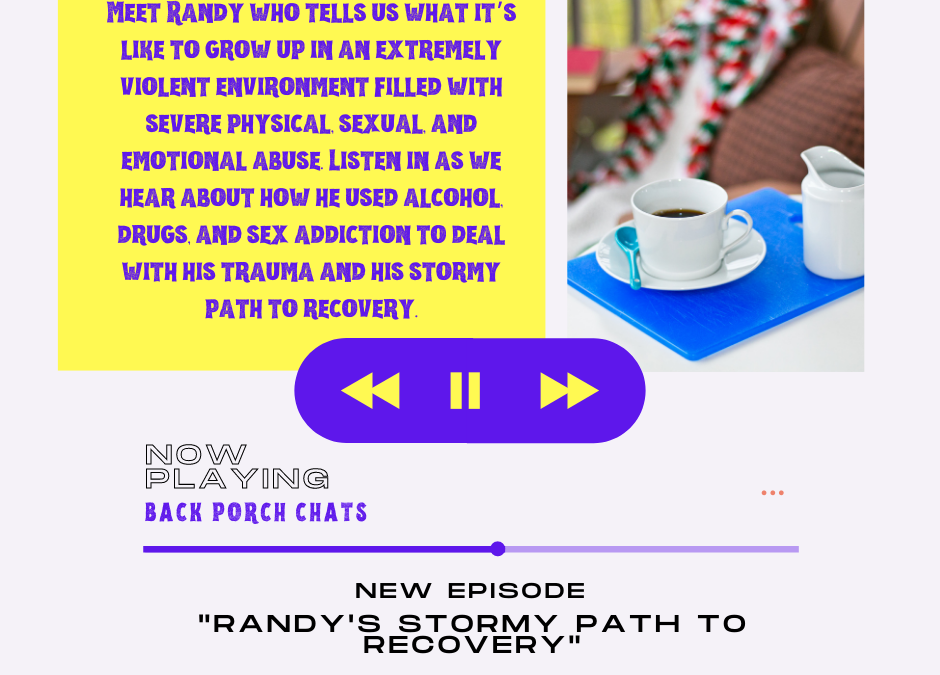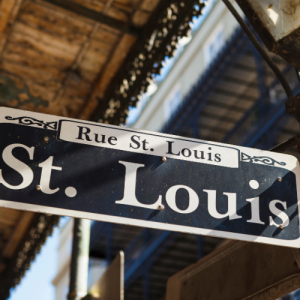In this episode: Randy’s story about his path to recovery
Vince: All right, Gina, here we go. Another podcast and I am so excited about our guest today.
Jeanna: You want to tell me about him?
Vince: This is a longtime friend of mine. We go back years. [00:00:51] Early on when I started my recovery 27 years ago in the rooms, he became a deep friend. We have shared so much together. He knows every ugly thing about me, and I know every ugly thing [00:01:06] about him. That’s one reason we don’t tell on each other. We know that stuff.
He has a story that will just set your hair on fire. It’s one of the most amazing stories from his childhood. [00:01:21] Having said that, I’m going to bring on my friend of 27 years. Mr. Randy. Welcome, Randy, welcome to the show.
Randy: Thank you for asking me, Vince. I’m certainly glad to be here. I don’t know if [00:01:36] you want me to just go on and start or if you want me to listen.
Vince: I think that what we usually do here is kind of have a conversation of sorts as we go along, but I really and truly [00:01:51] think that you have such an amazing story that why don’t you just get into your story, and as you go on, we might ask a question or so. I know that Jeanna is going to be really intrigued and have some questions, so just start your story.
Randy’s Story
Randy: [00:02:06] I’ll certainly be happy to. Well, I’m not happy to. I’m never happy to tell my story to anyone, but I feel like it’s an essential part of my recovery to share my [00:02:21] story with others who might have some of the same problems, and maybe in some way, they’ll find a modicum of hope for themselves.
My story began many years [00:02:36] ago. I’m 71 years old now. Probably the earliest memories are of about six years old. My mother [00:02:51] was a drug addict, and my father was a hardcore alcoholic. I was born and raised in a place where people still did a lot of moonshine and that’s what my father drank. [00:03:06]
They were in the process of getting a divorce when I was born, and when I was 7 months old, they took me to live with my aunt and uncle. My uncle [00:03:21] was the brother of my mother. It was myself and my sister who was four years older than I. I think they wanted the sister, but they didn’t really care [00:03:36] much about me. They had a daughter of their own, and they doted girls. Boys were just an afterthought.

Randy’s First Memory
The earliest memory of any kind of abuse was when I was six. I was put in [00:03:51] the garden to hoe corn, and I hoed up about six feet of a cornrow. Of course, a six-year-old boy doesn’t really know the difference between a stalk of corn that’s 3 inches tall and a weed.
When [00:04:06] my uncle came home, he had a very good friend who lived next door to us, and they were sitting on the tailgate of the next-door neighbor’s pickup truck. [00:04:21] They called me out there, made me drop my pants, and they beat me with their belts until I turned bloody.
Of course, that six-year-old boy cried, and they continue to beat me and yell at me and tell me [00:04:36] that they would make sure that I cried. I didn’t cry because I didn’t have anything to cry about. Before that whipping was over, I stopped crying, and I didn’t cry again until I was 42. [00:04:51] Even that was a long time ago.
His Introduction to Alcohol
I got drunk the first time at 11 years old with my best friend, Gary. We stole some [00:05:06] wine and drank it and got really drunk and sick. I can remember loving that. I loved the way it made me feel because it made me not feel. Gary promised that he would never get drunk again. As far [00:05:21] as I know, he didn’t.
This beating that I took was just one of many. They happened two or three times a week. We had an outhouse, an old outdoor [00:05:36] toilet. We didn’t have plumbing in the house—a very poor community that we lived in. I would go to that outhouse and take toilet paper and wipe the blood off my legs where it ran down my leg. [00:05:51] That was just an ordinary thing. It was an everyday thing nearly.
They didn’t care where I went as long as I didn’t bother them. [00:06:06]
Hiding Out
I don’t know if you know anything about the landscape in Ohio or not, but in Southeastern Ohio, it’s a lot like it is in West Virginia. It’s mountainous and rocky and full of what we call hollers. I would go and wander up in those hollers and found a place up there under a big old rock. I think it [00:06:36] was a glacial rock that was moved there during the last ice age. There was an indentation under one of those rocks. I found that I could stay there, and if [00:06:51] I worked at it hard enough, I could stay warm in the winter, so spent many days in what I called my safe place, but I didn’t call it that at that time.
I found ways to feed myself. I’d go out and I’d steal food. I think people knew what was going on at home, and they kind of helped [00:07:21] me out a little bit. I had a rap that I followed. First, I would go to this house, and they’d have one thing out, and I would go to this house, and they’d have something else. That’s the way I got food.
Usually, when [00:07:36] I came back from being in my place, I would naturally get a whipping for not letting anybody know where I was. Of course, they didn’t care where I was, but I got the whipping anyway. I think they like to whip [00:07:51] me better than anything.
Sexual Abuse Begins
When I was 11 years old, my uncle and his best friend took me fishing along Wills Creek. If you look on the map of Southeastern, Ohio, you’ll find [00:08:06] the creek. That was the first time that I was raped. I was raped by my uncle and his friend and threatened with death if I said anything. That became another [00:08:21] ritual.
When I was 12, my uncle loaded me up in the car and carried me off. To me, it was a long way. I discovered later that it wasn’t so far—about 25 [00:08:36] miles. We came upon a gate in a field and he told me to get out and open it. Then we came upon another gate. He told me to get out and open and close it behind me. A man met us on top [00:08:51] of the hill, and he gave my father, or my uncle rather. I don’t know why I call him that. It must be some psychological thing. But he gave my uncle some money, and he took me with him. [00:09:06]
At the Camp
We went over to a camp on the Muskingum river which is a large river that feeds into the Ohio River and they had this camp there. They stripped me naked, put a dog [00:09:21] collar around my neck with a little padlock, hooked a chain to the padlock, and then they locked me onto a pole. That’s where I stayed until they decided they wanted to party, and then they’d bring me out and party, [00:09:36] what they called party. They were mostly drunk.
They would, both men and women, have their way with me—rape me and do whatever I was told. There was a girl [00:09:51] there who was in the same situation as me. I was forced to have sex with her. That went on for my 12th, 13th, 14th, and 15th summers. For [00:10:06] four summers that went on. Then I guess I got too big, and they got maybe a little frightened that I might fight back. For some reason, the thought of fighting back never occurred to me.
I went home, [00:10:21] and my uncle and aunt both had friends that they would have sex parties with and drunk parties. I was forced to join that.
Going to School Drunk
When I got to be 17 [00:10:36] years old, I joined the military just to get out. By this time, I was a full-fledged alcoholic. I would steal all the whiskey out of the still, well not the whiskey. They watched it [00:10:51] too close when it came to the whiskey, but they had a thing they called still beer that was part of the process of making whiskey. It will get you drunk as a skunk. I used to go and steal the still. [00:11:06] I’d get drunk on that, and I’d look forward to the times that I would be drunk. Many times I went to high school drunk because I’d been drinking still beer.
Eventually, I learned [00:11:21] to hide the smell of it on my breath with aromatic things that would mask that smell. I don’t really think it masked it so much as it made me feel a little better.
Life in the Military
I joined [00:11:36] the military when I was 17. My friend that got drunk with me the very first time joined with me. He and I were within a few days of being the same age. We joined on [00:11:51] what the Army had at that time called a guaranteed enlistment. Of course, Vietnam was going strong in 1967, so that went out the window. Gary went to an artillery school, and I went to infantry [00:12:06] school. When we were finished with school, Gary went to one place, and I went to another place.

I went to Fort Belvoir Virginia, and I learned that I could pick up a hooker [00:12:21] and hire her for $20, and I could get as rough with her as I wanted, so I did that. On my 18th birthday, I got orders for Vietnam. I can’t say that I was scared [00:12:36] of going to Vietnam. It was just something different. It was a weird kind of feeling.
To Vietnam
I went to Vietnam and they assigned me to the third and 47th mobile riverine in the 9th [00:12:51] infantry division. Our job was long-range patrol. We did long-range patrol while we were in the Mekong Delta, and we did long-range patrol on the Ho Chi Minh Trail. Now they say we were in Vietnam. I don’t know. Some people said we were in Laos and Cambodia and all kinds of different shit. But I don’t know.
They gave us what they called malaria pills. If you were on base camp, you took one each week. [00:13:22] When we were out together, we might take two or three of them a day. Later on, I realized that they were probably drugs to keep us speeding.
I discovered marijuana by then. [00:13:37] I would take the drugs to make me speed and smoke the weed to make me slow down, and they kind of counteracted with each other, and I got to a point where I couldn’t control [00:13:52] either of them. Of course, the alcohol flowed freely. They gave us what we called beer stamps. They were tickets that we could use to buy alcohol with whether it was whiskey [00:14:07] or beer or whatever. I found myself working really hard to trade people out of their beer stamps, so I could have more.
The Violence
This is the really hard part. I killed 19 people while [00:14:22] I was there, and I felt no shame—no guilt. When I would get back to base camp, I would drink and drug, so I wouldn’t remember any of them. I tucked it neatly away in my little box. [00:14:37] I had a little box that I kept all of that shit in
The people in my outfit thought I was a dangerous man because I would go so over-the-top when it came to being in firefights. [00:14:52] I didn’t understand that at the time. An eighteen-year-old boy just doesn’t understand a whole lot of anything. Later on, I realized that they were right. I had gone off the beam with [00:15:07] the violence that I so much enjoyed.
I was in that unit for seven months. Then I think they had enough of me. When we come back off patrol, we’d have these [00:15:22] gun cleaning parties, and we’d all sit together and bullshit and clean our weapon, but they separated me from them and put me in the supply room. I would clean my weapons there by myself. I don’t think they trusted me [00:15:37] with weapons, but in seven months, I killed 19 people, and as I said, I at that time I felt no guilt, no shame. I’m not sure if that was because of the inherent meanness [00:15:52] in me or whether it was because I was drinking and drugging so much that it locked itself away.
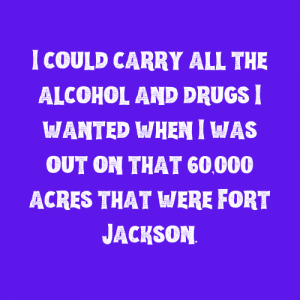
Returning Home From the War
I came home from Vietnam. They put me in post engineers in [00:16:07] Fort Jackson, South Carolina. I didn’t have a clue what they wanted me to do there. I went for an interview with the post engineer sergeant major, and he didn’t know what to do with me. They put me in a thing [00:16:22] they called range maintenance. It was a unit that did maintenance on all the rifle ranges and whatever else they had.
They decided that I was a loner, and they put me somewhere else. [00:16:37] That was really freeing for me because I got to work by myself. I could carry all the alcohol and drugs I wanted when I was out on that 60,000 acres that were Fort Jackson. [00:16:52] They decided that they wouldn’t have it. I was a buck sergeant by virtue of my service in Vietnam, and I had no training as [00:17:07] a non-commissioned officer, so they sent me to the NCO academy.
My first wife chased me down and she was, I suppose, exactly what I needed at the time. I don’t think she knew [00:17:22] what she was getting into. We drank together and we drugged together, and then she got sober, and I didn’t. It became a war on wheels I guess. Every opportunity I [00:17:37] had I would go out and pick up a prostitute and do the same things to her that I did to everyone else. Of course, I think she suspected, but I don’t think she could ever prove anything. It got [00:17:52] worse and worse, of course.
Return to Civilian Life
I left the military, got a very good job, got promoted through my stuff, and still drank. I kept a 12-pack of beer in my water cooler. [00:18:07] If they’d have caught me, they’d have fired me. I didn’t care. I didn’t care about anything but getting my next drink, getting my next drug, and picking up my next hooker.
It got to a really bad place, and I got in [00:18:22] a fight. I got in a lot of fights. I’d go to a bar and find the prettiest woman there who had the ugliest biggest meanest boyfriend and I’d go to hitting on his girlfriend. Of course, I’d get my ass kicked. [00:18:37] My wife and I got in a big fight, and I wound up spending the night in the Daphne city jail. I got out of it, but I knew in my heart that that marriage was on the downturn. [00:18:52] It wasn’t going to last. Finally, she kept on. You know, a woman can remember things that you said verbatim five years ago. That’s uncanny. [00:19:07] The wife I have today can remember verbatim things I said five years ago. What is it about women that can do that? I don’t remember yesterday.
Recovery
The fighting got worse and worse. She [00:19:22] wanted a house. I built her a house. I drank and drank and drank. One night we got in a fight, and she tore the door off the master bedroom. Knocked a big hole in the sheetrock. I [00:19:37] just said, “I can’t do this anymore.”
I was in the program at this time. I’d been in for a couple of three or four years. I called my sponsor and said I’m going to be walking in your direction. He asked [00:19:52] me where I’d be and I told him. He said, “I’ll meet you,” so I met with my sponsor, and I lived in his house for about six months or more.
Then I met Gail. I met Gail in an aftercare group. [00:20:08] It took me a good long time to build up the courage to ask her out on a date. When I did, she wouldn’t trust me. We had to meet somewhere. I was done with drinking. I hadn’t had anything to drink for a good long time, [00:20:23] but that trauma, all that childhood trauma, it would come back again and again and again and again. It would just eat my ass along. If I didn’t spend all my time with someone in the program, I knew that I was [00:20:38] going to drink. I knew that I was going to use drugs. I knew that I was going to go out and pick up a whore. My only escape was to stay with people who were in the program.
People in Recovery
Thanks be to God that [00:20:53] I’d met people like Vincent, that I’d met people like Glenn who was my sponsor. I laugh today that when I first got into the program, I had an old guy, his name was Frank, and [00:21:08] he came up to me, he put his hand on my shoulder, and he said, “I’m your sponsor. Call me every day.” He gave me a business card that said, “Frank, drunk,” and his phone number.
I didn’t call him the first day. The second day, I called him. [00:21:23] He chewed my ass for not calling the first time and he chewed my ass pretty regularly, but he never did hit me. He instilled in me the idea that I had to have a higher power that was stronger than me.
Well, [00:21:38] hell. There wasn’t anybody stronger than me.
I was making more money than I could spend, and was doing very well with myself. Then he got a brain aneurysm, and he died. Glenn told me that he was my sponsor and [00:21:53] damned if he wasn’t the same way that Frank was. Chewed my ass, but I think they intended it as a good thing because it was what I needed. I needed grounded in my recovery. Then [00:22:08] Glenn had a stroke, and he died, and I got to ask somebody to be my sponsor. I asked Bill, and Bill’s been my sponsor ever since.
His Recovery Journey
I try to live my life as best as I [00:22:23] can. I went to five different treatment centers. The last one was at Masters and Johnson sexual trauma treatment center in St. Louis. I think they moved to California. [00:22:38] There wasn’t anybody that could crack that shell of denial that I’d built around myself. I was so deep in my own denial I wouldn’t call myself a drug addict. I wouldn’t call myself a sex addict [00:22:53] or alcoholic. Those were for other people. Those were for the people you saw laying in the gutters. That wasn’t for me.
Although I do remember waking up in a gutter or two. I remember hunting [00:23:08] my car for three days. I remember spending $1000 in a titty bar, but I don’t have to do that now. The people in at Masters and Johnson, they cracked that denial and [00:23:23] all of this bullshit came pouring out like it’s pouring out with you. I know I’m leaving out a hell of a lot of what my life was like, but they convinced me there that the trauma would never go away, [00:23:38] and it’s never going to go away—not ever. It’s always going to be in my mind. For anybody who’s been traumatized, it’s always going to be in their mind, but I don’t have to let my trauma rule [00:23:53] my life.
Treatment at Masters and Johnson
At Masters and Johnson, they encouraged me to keep that little hidey-hole that I went to when I was eight years old until I graduated high school. That was my safe place not to tell anybody [00:24:08] about it. That was my place. No one else’s. They taught me that I could put that trauma in a box and put it off on one side of my psyche. It was never going to go away. Sometimes [00:24:23] it’ll burst out, and I have no control over it, but I know how to put it back in.
Vincent told me not to talk about 12-steps, but fuck Vincent. [00:24:40] I’ve been sober longer. I have an eleventh step that I could go to. I pray [00:24:55] for knowledge of God’s will for me and the power to carry that out. In that eleventh step that I take, I find the knowledge to put that trauma back in the box, to not deny that it’s there. But [00:25:10] just to keep it separate from my life.
I have a wonderful life.
Vince: For those that might not know it. What is the 11th step?
Randy’s Higher Power
Randy: The 11th step [00:25:25] is one of the 12 steps in our recovery program, the program of AA. It basically covers all the program. The eleventh step is just simply praying for knowledge of God’s will for us and [00:25:55] the power to carry that out. That’s the way it quotes. That step has become very important to me. I work that step every day that I wake up.
I used to laugh [00:26:10] at the biblical version of [Moses] and his burning bush. God spoke to him out of a burning bush. I used to think that’s ridiculous. God doesn’t speak out of a burning bush, but I’ve discovered that we [00:26:25] all have a burning bush, whatever that may be. It may be a bush that catches on fire or the tablet of Ten Commandments. It may be a room full of people who are in a similar shape that I am in. I listen [00:26:40] to each of you for knowledge of my God’s will for me and the power to carry that out, and you have become my burning bush.
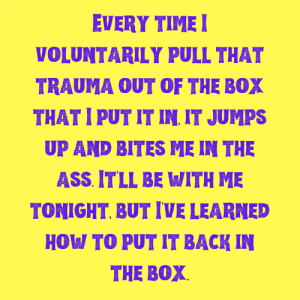
The Effects of Telling His Story
This is going to be with me tonight. Every time I voluntarily [00:26:55] pull that trauma out of the box that I put it in, it jumps up and bites me in the ass. It’ll be with me tonight, but I’ve learned how to put it back in the box.
Vince: You’re so courageous for doing that.
Randy: [00:27:10] I do suffer the trauma. I have to remember it for your sake, for my sake, for all of our sakes because there might be something in that trauma that you’ve heard that will [00:27:25] help someone. That’s why I pull it out. I’ve learned how to put it away, and I can do that. By tomorrow, it’s going to be gone. I’m glad for that. That’s how far I’ve come in 29 years. [00:27:40] I’m really glad that y’all invited me tonight. I’m glad that this is what it is. Every time I talk to people about my story, it’s never the same. Well, it’s always the same, but it’s always different.
Lost Time and Disassociation
Vince: [00:28:25] There was one group that had to do with our sexual addiction that we met in and that we worked. You were or sober from alcohol and drugs for quite a long time. [00:28:40] Because of the nature and the insidiousness of the abuse that you had, you did something that was called lost time. It was a way that you dealt with the pain of those memories coming up. Do you remember [00:28:55] what I’m talking about? That was one defense mechanism that kept you safe, kept you from hurting others and hurting yourself, but you would actually disassociate. Talk [00:29:10] about that part if you feel like it.
Randy: There were many times when I would dissociate from my current reality. At that time, I didn’t have that box [00:29:25] to put my trauma in. I think building that box takes a lot of time. It takes a lot of practice—takes a lot of prayers.
Out of all the different things, I’ve used EMDR therapy. [00:29:40] That’s eye movement desensitization reprogramming. I’ve used dissociation. Dissociation is a time when I would feel that trauma welling up, and I [00:29:55] had no control. I had no control whatsoever over the trauma that permeated my life. What I would do was go off, just not be there. I would totally and completely [00:30:10] dissociate myself from anything that was going on.
Other People Respond to His Trauma
One of Vince’s wives used to say, “and he’s gone again,” but disassociation to me is a tool. It’s a tool that we can use [00:30:25] to keep ourselves safe. If I hadn’t dissociated, I would have surely relapsed and been back right where I was. When I came out of that dissociation, I was weak and sick, [00:30:40] full of shame, full of guilt, and I had to deal with that after the dissociation. Building that box for my trauma to go in where I can close the lid, I don’t have to [00:30:55] really dissociate anymore, although it does happen on occasion.
Usually, Gail’s not afraid of me, damn it. She’ll smack me, and she’ll say come out of it, Randy. You’re loved, [00:31:10] and I usually will come out of it pretty well, so I don’t have a lot of problems with dissociation.
Vince: Telling you that you are loved is an important part of that whole [00:31:25] thing, what Gail brings to you when you disassociate.
Randy: Absolutely the best thing that ever happened. I had some times when I was at Masters and Johnson, and [00:31:40] I would talk with Gail from being curled up in a ball, and she would just tell me that she loved me and to keep on keeping on. That I was doing the right thing. Although at the time it didn’t feel right.
Feeling the Trauma
Vince: No, [00:31:55] it feels terrifying.
Randy: Any time we deal with the trauma in our lives, we have to also deal with the fear that it burns wrong.
Vince: For me, it felt more like terror than fear. [00:32:10] I know that you were sober from alcohol and drugs several years before the nature of your abuse kept breaking through and that you got to the place where you were strong enough to deal with it. [00:32:25] But you had to stay sober, and I know you use the 12-steps for your alcohol and drugs and some of your sexual acting out. There came a time after that sobriety that you had to have [00:32:40] some professional help.
Sober Recovery
Randy: Absolutely, Vincent. Four of the treatment centers that I went to while I was sober. I’ve [00:32:55] been to Masters and Johnson’s too. That’s one of those that I went to when I was sober. The three Places that I went for recovery [00:33:10] with a professional therapist were here in Mobile. The last one I went to they came up to me and told me, “look, we can’t crack the egg. We want [00:33:25] to get through all of this stuff that is traumatizing you and get to a place where you can deal with the trauma and not have it be dealt with drugs and alcohol [00:33:40] and sex.
They’re the people who recommended me to go to Masters and Johnson. Masters and Johnson, at that place, I had my own personal therapist who was with me every day all day, I had my own personal shrink who was with me at least two of those hours every day, and I had the facilitator of the whole thing who [00:34:10] I met with two or three times a week. It was intense therapy, to say the least. They used group settings, they used EMDR, they used rational emotive [00:34:25] therapy, and they used hypnosis.
I don’t know. For some reason, they cracked it. They were able to get in there and before I left Masters and Johnsons, I was able to talk about it without going [00:34:40] out and getting drunk.
Testing Sobriety
If you know where I was in St. Louis, it was in the Irish section of town, and there was a fucking bar on every corner. You know, God was with me because [00:34:55] these were little jackleg bars. I’d stick my head in a bar and there’d be the bartender there and two guys sitting at the bar drinking. They’d turn around and look at me and say, “well, who the fuck are [00:35:10] you?” like I was definitely not welcomed, so I’d go on to the next bar. I’d get the same reception. That’s the way it was in St. Louis. There was a bar in that Irish section of town on every other [00:35:25] street corner.
Vince: Especially when you’re in that setting and you’re having all of this denial and delusion stripped away and you’re slowly having like you said, the egg cracked so that you can slowly retreat back into [00:35:40] that trauma and stuff. When you go back, learning how not to re-traumatize yourself, but actually heal it and stuff, it’s a knee-jerk reaction to return to that tool of drug and alcohol and acting out and that [00:35:55] sort of stuff. It’s just that knee-jerk reaction to go back there because that’s instant relief.
Randy: I think a lot of it [00:36:10] was kind of fortuitous that the people in those bars were like they were. Had they been inviting, I probably would have gotten drunk.
Returning to His Life
[00:36:25] They sent me home, but they wouldn’t until I had an appointment with a therapist here. I came home, and it was a lady here in Daphne that I went and saw. I saw her for a couple [00:36:40] of things. Then this the program started kicking me.
Vince: By the program, you mean the 12-steps?
Randy: The recovery program that I was working started kicking my ass. It made me feel excited. Then my relationship [00:36:55] with Gail was deep, and we went to talk to Pastor Dick Smith at the Episcopalian Church here in Daphne about marrying us. He said, “well, I’ll marry [00:37:10] you, but you need to have a couple of appointments with a therapist before we do that.” I said okay, and he called and made the appointment.
I went to that appointment. Lo and behold it was the one who was the person [00:37:25] that I had the appointment with when I left Masters and Johnson. She didn’t know my story, so she asked us to tell her about that. Gail told her stuff. It was normal codependent [00:37:40] sicko puppy stuff. Then I told her my story, and I watched her kind of “oh shit. Oh shit.” Then when I was through she said, “now, you know, [00:37:55] this might take more than just a couple of appointments. I laughed and I said, “well, I’ve had more than just a couple of appointments.”
We went on and got married.
Vince: With some of the best in the business.
Randy: Say [00:38:10] what, Vincent?
Vince: I said with some of the best in the business.
Randy: Oh, yeah.
Recovery in a 12-Step Community
Vince: Randy, I love your journey and what you just said. You had to get physically, emotionally, and spiritually sober for a little while. [00:38:25] Then the memories of the abuse got so bad and you didn’t have your primary tools so you went and got some professional help. Then you came back and you re-emersed yourself in the 12-step community. You just mentioned that you actually [00:38:40] were able to embed yourself a little further into that community. You got some more intimacy in that community.
For me, the 12 steps [00:38:55] and that initial physical sobriety is important, and then if we need the therapy and that kind of help, that becomes important, but the community. What has the 12-step community, having a safe place to be who you are, [00:39:10] what has that meant to your recovery?
Getting to Meetings
Randy: Well, with this pandemic and everything, it’s hard to go to meetings with my age and my heart condition. I can’t get myself to go out there [00:39:25] without the vaccination, and it’s been hard for meetings, but I found Zoom meetings and Vincent was an instrumental part of creating that, and I’m so eternally grateful to Vincent [00:39:40] for that, but I found that since I’ve finished with all those treatments that I still need an outlet. It’s like I said a while ago, the 12-steps and 12-traditions [00:39:55] have become very important to me.
Now, they may not be important to another soul in the world. That’s okay. For my recovery, what’s important to me is what’s important. After all these years, I still find [00:40:10] myself doing four or five meetings every week.
I hear the struggle of other people. I hear what they do to bring themselves back [00:40:25] out of that, and I can relate. As I’m listening to someone share, I’m listening for what they’ve done, what they can do, what [00:40:40] I can do in my life to make my recovery more sound.
Enjoying Recovery
Today, my recovery is the second most important thing to me. The first most important thing is my higher power, my God, [00:40:55] the second most important thing is my recovery, and the third most important thing is my program. It’s with the people in these meetings that I hear my higher [00:41:10] power talking.
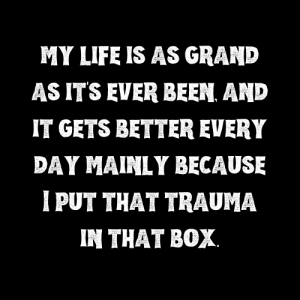
My wife, we have a talk probably three or four times a week that lasts an hour on what we’re doing for our own recovery. That’s very important. I’m retired [00:41:25] now. I don’t have to fucking work. But my life is as grand as it’s ever been, and it gets better every day mainly because I put that trauma in that box. I know where it is. I can pull it out anytime I [00:41:40] want to. It pops itself out of the hole sometimes, but I know how to deal with it. I can pray, I can go to God, I can go to my wife, and I can go to you people.
It’s a pretty fucking wonderful life. I hadn’t missed a meal in a long time, [00:41:55] I’m grateful for that. There are so many things that I’m grateful for in my life. But my God my wife and my recovery are the three absolute most important things, and you are the instrumental part of my recovery.
Vince: [00:42:10] Abuse, it doesn’t matter if it’s physical, mental, emotional, or sexual, can really scar us and make our lives very difficult. We cover [00:42:40] that up with drinking and drugging and acting out, but there is hope if we’re willing to face that we need help doing that, both professional and 12-step.
Wrapping Up
Vince: We got some stuff that we need our listeners to do. I know one [00:42:55] thing we need them to do is to subscribe. So, if you’re out there listening to podcasts, hit that subscribe button. Listen to the podcast here.
Jeanna: Go ahead and post a review if you would.
Vince: Oh, yes. [00:43:10] Yes. Tell us how wonderful you think we are or how bad we are. We don’t care. Just talk about us.
Jeanna: We really like to get our message out to as many people as we can, and the best way to do that is to go ahead and post a review maybe share [00:43:25] an episode of the podcast with someone you think might be interested in hearing it. And go ahead and keep on listening.
Vince: Well, that wraps up another program here at Back Porch Chats [00:43:40]. Special thanks to my friend Randy. One of the brave warriors of recovery and one of the most courageous people in recovery that I know who I love dearly who saved my butt on more than one occasion and [00:43:55] until next time at Back Porch Chats. This is Vince…
Jeanna: and Jeanna.
Randy: Thank you all.
Vince: Thank you, Randy.
Get More from Back Porch Chats:
Connect with Jeanna Online:
Follow the Now Sober Coach Facebook Page
Join the FREE Now Sober Coach Facebook group for Community and Support
Check out the Now Sober website
How You Can Help
If you enjoy this podcast and would like to offer your support, there are three things you can do.
1. Head over to your favorite podcast app , subscribe, and leave a review.
2. Share this episode on social media.
3. Visit our store and wear your support. Now available: Back Porch Chats Merchandise in the Now Sober Lifestyle store
Subscribe to our Podcast on:
Apple
Spotify
Stitcher
Buzzsprout

